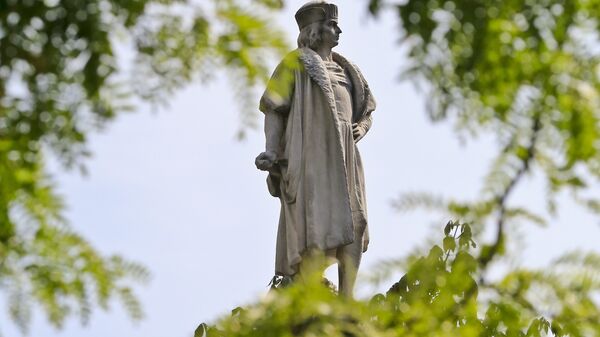Columbus Day received nationwide recognition in the US in 1937, by the order of President Franklin D. Roosevelt. Initially set to be celebrated on October 12th, it was to be a day to display the American flag and engage in "appropriate ceremonies in schools and churches" on an annual basis. Before that, the date was a state holiday in Colorado for over 30 years, beginning in 1905.
Thanks to that understanding, increasing number of people agree that the conquerors of the New World brought rape, murder and plunder.
Oh, and the Europeans also brought along new diseases which have now been recognized as the main cause of death of a staggering 95 percent of the original indigenous people between 1492 and about 1915.
Did Columbus really "discover" a land where other people already lived?
Some also observe that Columbus's discovery fueled the world slave market in an unprecedented way.
"The ensuing Age of Discovery, with its expansions of empires and exploitations of New World natural resources, was accompanied by the seizure and forced labor of human beings, starting with Native Americans," writes Peter Nabokov of Berkeley California University in his 2016 essay, quoted by Quartz's John Mancini.
A reflection of the changing attitudes comes in the form of Indigenous People Day — a holiday first adopted in 1992 by Berkeley, California. Since 1992, several dozen cities have adopted the renaming of the holiday, celebrating it on the former Columbus Day — the second Monday of October.
Proponents of the new holiday mark 2017 as a major step forward for their movement, as some 20 cities have now voted to "make the switch" by replacing the old holiday with the new. The biggest city to make that switch this year is unquestionably Los Angeles.
"This gesture of replacing Columbus Day with Indigenous Peoples Day is a very small step in apologizing and in making amends," LA City Councilman Mike Bonin said, in an interview with the Los Angeles Times.
In his essay for Quartz, Mancini tells the story of Italians coming to the New World beginning in 1880, working as cheap labor — not slaves — but still looked down upon as a mere working bodies.
"The hardest labor is reserved for the Italian worker. Few regard him with a sympathetic eye, care for him or remember that he has a heart and a soul: they merely look upon him as an ingenious machine for work," Mancini quoted Frances Xavier Cabrini, the first nationalized US citizen to become canonized by Roman Catholic Church.
In 1891, 11 Italians were lynched in New Orleans by a mob that held them responsible for the death of police official — the largest mass lynching in US history.
For Italian immigrants, Columbus became a statement of national pride.
"It was one of the things that would allow them to become Americans symbolically," said Fred Gardaphe, a professor of Italian-American studies at Queens College.
The standoff resurfaced recently after New York Mayor Bill De Blasio — whose maternal grandparents were Italian immigrants — appointed a committee to evaluate whether monuments to certain historical figures should be removed, quickly prompting a backlash from fellow Italian-American descendants who vowed to defend the Columbus statue, which has stood over Columbus Circle in Manhattan for over a century.
Last month, vandals doused the hands of the Christopher Columbus statue in blood-red paint and scrawled the words "hate will not be tolerated."
Whether Columbus was, in fact, of Italian ancestry, is a matter of ongoing debate. Columbus was born in Genoa, a free city, claimed at times by a number of states, including Greece and Poland. During his lifetime, there was no united Italian nation.
According to the Library of Congress, "Italy as a unified nation did not exist until 1861… the Italian peninsula has sent millions of its people to the shores of North America. These new arrivals thought of themselves as Neapolitans, Sicilians, Calabrians, or Syracuseans."
It is also notable that Columbus was only able to make his voyages under the auspices of the Spanish monarchy who funded the expeditions and agreed to provide Columbus with substantial benefits for lands he claimed for Spain.





